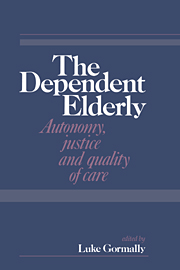Book contents
- Frontmatter
- Contents
- List of contributors
- 1 Introduction
- 2 Difficult choices in treating and feeding the debilitated elderly
- 3 The American debate about artificial nutrition and hydration
- 4 Reflections on Horan and Boyle
- 5 The Living Will: the ethical framework of a recent Report
- 6 Some reflections on euthanasia in The Netherlands
- 7 Is there a policy for the elderly needing long-term care?
- 8 Is it possible to provide good quality long-term care without unfair discrimination?
- 9 The prospects for long-term care: current policy and realistic alternatives
- 10 What is required for good quality in long-term care of the elderly?
- 11 Should age make a difference in health care entitlement?
- 12 Economic devices and ethical pitfalls: quality of life, the distribution of resources and the needs of the elderly
- 13 The Aged: non-persons, human dignity and justice
- 14 Economics, justice and the value of life: concluding remarks
- Index
11 - Should age make a difference in health care entitlement?
Published online by Cambridge University Press: 01 October 2009
- Frontmatter
- Contents
- List of contributors
- 1 Introduction
- 2 Difficult choices in treating and feeding the debilitated elderly
- 3 The American debate about artificial nutrition and hydration
- 4 Reflections on Horan and Boyle
- 5 The Living Will: the ethical framework of a recent Report
- 6 Some reflections on euthanasia in The Netherlands
- 7 Is there a policy for the elderly needing long-term care?
- 8 Is it possible to provide good quality long-term care without unfair discrimination?
- 9 The prospects for long-term care: current policy and realistic alternatives
- 10 What is required for good quality in long-term care of the elderly?
- 11 Should age make a difference in health care entitlement?
- 12 Economic devices and ethical pitfalls: quality of life, the distribution of resources and the needs of the elderly
- 13 The Aged: non-persons, human dignity and justice
- 14 Economics, justice and the value of life: concluding remarks
- Index
Summary
The health care needed by many people, not only by the elderly, is limited for a variety of reasons. Sometimes a person does not want certain medical treatments, and it is often reasonable and morally correct for one to act on such a desire; sometimes others decide not to provide health care for a patient not capable of deciding for himself or herself, because of their judgment that such treatment does not help the patient or harms the patient more than it helps him or her. But sometimes health care is limited, not out of concern for patients' well-being or legitimate desires, but because there are not sufficient resources to provide the needed care. The moral issues raised by these different grounds for limiting health care are distinct, although, as I will suggest, they are sometimes confused. I will be focusing only on limitations based on the scarcity of health care resources.
A scarcity of health care resources can emerge within any social arrangement for providing health care. Perhaps the most obvious situations in which this happens are medical disasters when triage is called for to distribute fairly resources which, in the circumstances, are insufficient to assist all who need them.
- Type
- Chapter
- Information
- The Dependent Elderly , pp. 147 - 157Publisher: Cambridge University PressPrint publication year: 1992
- 1
- Cited by

